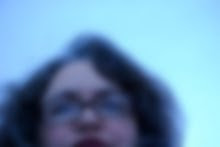6.6.06
On authenticity...
This conversation concerns a a set of poems written and compiled over a 20-year period. While the work is original, I am inclined to believe that, having read elsewhere a poem that so perfectly mirrored my own sentiments, I became sometime thereafter deluded into believing that the words must be my own. So I am nagged with the worry I have read some or even many of my own words before. (I have therefore asked to be contacted should any of the lines strike a too familiar note -- see links.)
However, when not feeling mildly guilty for having (or not having) purloined another's texts, I have wondered at the legitimacy of claiming any text as one's own. That all poets steal is something of an aphorism. The reason for this seems (to my mind) eminently clear: the porosity of any artist's imagination is necessary to the mapping out unexpected associations. However, I also suspect that at times poetry arises out of a nearly autistic response to still the barrage of endless noise or distill it into a form if not more legible than at least constrained.
It follows (according to my addled logic) that if we are assaulted constantly in our lives by all forms of media, do we not as individuals have a right to appropriate and reformulate that which has been imposed upon us? I am reminded of a story about a poor student who eats his plain rice while inhaling the aromas of a local restaurant, whose owner then attempts to charge a fee for his smells. Likewise, did I ask to hear Stairway to Heaven 730 times during my fifteenth year and —if not— should I be deterred from its appropriation and re-use?
I suppose the question implied concerns the point at which intellectual property is transformed into raw data. In this a fine line is erased between that which possesses us and that which we ourselves possess — just as some would argue that language (overheard and appropriated as infants) is somehow deeply reflective of and imbedded within the structure of our minds.
Where of course one could make the argument above as concerns mass distributed media (or learned language), I suppose the words of other poets could hardly be said to fall into the realm of the hyper-prevalant — which is why I have asked for help in locating my sources. Someday I imagine a giant wikipoetry project will unfold wherein all poems and all sources will be connected (including legal texts, sitcom scripts, science journals, school yearbooks, farm equipment catalogues, etc. etc.) coming eventually to mirror a Borgesian one-to-one map (only this time of all human discourse). The problem with this fantasy is that such a one-to-one map already exists and the one proposed would be no more than a parallel internet having interest for a very tiny portion of the world’s readers.
However, when not feeling mildly guilty for having (or not having) purloined another's texts, I have wondered at the legitimacy of claiming any text as one's own. That all poets steal is something of an aphorism. The reason for this seems (to my mind) eminently clear: the porosity of any artist's imagination is necessary to the mapping out unexpected associations. However, I also suspect that at times poetry arises out of a nearly autistic response to still the barrage of endless noise or distill it into a form if not more legible than at least constrained.
It follows (according to my addled logic) that if we are assaulted constantly in our lives by all forms of media, do we not as individuals have a right to appropriate and reformulate that which has been imposed upon us? I am reminded of a story about a poor student who eats his plain rice while inhaling the aromas of a local restaurant, whose owner then attempts to charge a fee for his smells. Likewise, did I ask to hear Stairway to Heaven 730 times during my fifteenth year and —if not— should I be deterred from its appropriation and re-use?
I suppose the question implied concerns the point at which intellectual property is transformed into raw data. In this a fine line is erased between that which possesses us and that which we ourselves possess — just as some would argue that language (overheard and appropriated as infants) is somehow deeply reflective of and imbedded within the structure of our minds.
Where of course one could make the argument above as concerns mass distributed media (or learned language), I suppose the words of other poets could hardly be said to fall into the realm of the hyper-prevalant — which is why I have asked for help in locating my sources. Someday I imagine a giant wikipoetry project will unfold wherein all poems and all sources will be connected (including legal texts, sitcom scripts, science journals, school yearbooks, farm equipment catalogues, etc. etc.) coming eventually to mirror a Borgesian one-to-one map (only this time of all human discourse). The problem with this fantasy is that such a one-to-one map already exists and the one proposed would be no more than a parallel internet having interest for a very tiny portion of the world’s readers.
